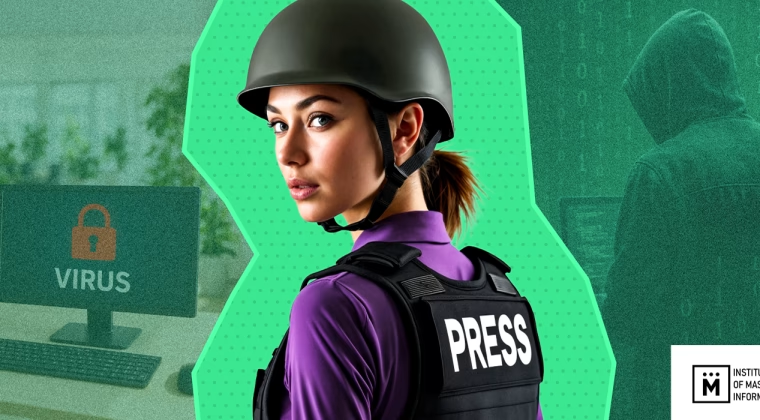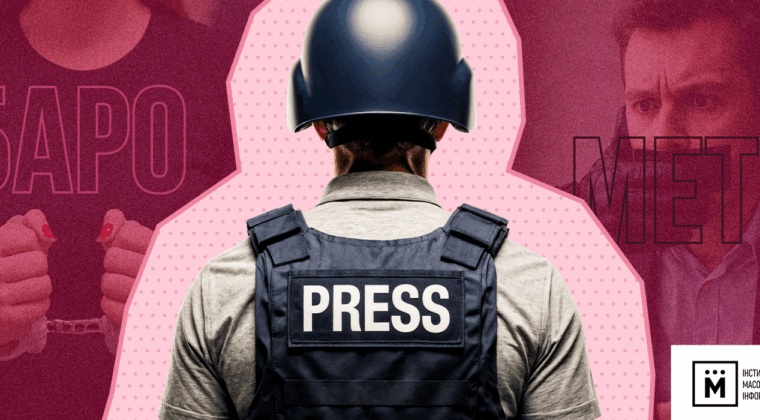A talk with the editor-in-chief of Kherson media outlet “Most”, IMI representative in Kherson oblast, Serhiy Nikitenko, about the Russians crushing the media space of Kherson oblast with the start of the full-scale invasion, about local journalists’ readiness to work amidst the hostilities and under occupation, and about those who sided with the enemy.
“Serhiy, where were you on February 24? Before that, did you discuss the possibility of hostilities in Kherson oblast with your colleagues?”
“I was at home. On February 24 I had to go to the hospital and get tested for COVID-19. I had already gotten well and had to confirm that I was healthy. That morning, Russia woke me up with an explosion in Chornobayivka. I looked out the window and saw smoke over the military base across the airfield. Somewhere around there; it was hard to tell. We knew from our colleagues that a morning attack was very likely. But, to be honest, until the very morning I refused to believe it, so I calmly went back to bed and peacefully slept through the start of the war.”
“How was your media outlet working on February 24? Did you feel lost at all? Did you have an action plan?”
“We did have an action plan. We realized that we had to leave Kherson, but we weren’t thinking about it at first. First thing in the morning, we got to work, trying to reach our friends or acquaintances on the left bank of the Dnieper by phone, because the fighting was already happening there for sure. There were many panicky rumours going around. We were the first to find out, sometime before lunch, that Russian troops were approaching Kakhovka, but we didn’t believe it until somebody sent us a video in which we recognized the highway intersection to Kakhovka. Then it became clear that the video was real and that it wasn’t our army. We got down to work, publishing a lot of news. Like many (media – Ed.), we started receiving emails from the Russians, the ‘DPRians’ demanding that we side with them. I don’t think we even replied any of them – we had no time. After lunch, a big DDoS attack began.”
“On your website, ‘Most’, or not only?”
“Hard to say. Some websites worked fine, and some stopped updating. Some media posted on Telegram channels only. But the attack on us was powerful. We were aware that the Russians were approaching Oleshky, the Antonivsky Bridge. Nobody was blowing the bridge up. We decided that we have to leave Kherson. So, on February 24 at noon our entire team left Kherson. We worked on Telegram, on Facebook, published news – the website was “down” and we could not “pick it up”. We worked like that for about two days.”
“When did you leave?”
“I left sometime around 15:00 – I was the last one from our team. We went to Vinnytsia, to Vinnytsia oblast. We all left for different places. As you know, finding an apartment was impossible, the prices ‘skyrocketed’ immediately. So whoever could, stayed there.”
“As the IMI representative in Kherson oblast, you had to keep in touch with other teams, coordinate the work. How did you interact?”
“At first, we had a small group chat – to be honest, it was just guys who worked in Kherson media. This is just how it happened to be, since the time we did a protest action together after journalists were not allowed to meet Zelensky during his visit to Kherson. You may remember it, when the news would come out blank. So, the chat remained from that time, and we used it to coordinate. Some guys left right away, some stayed in Kherson. On February 25, I tried to contact my colleagues – both those who remained in Kherson and those who left. We at IMI started compiling lists of journalists, asking who needed what help. At first, we were helped those who had left financially, because we understood what a difficult and expensive thing was. We felt lost. Only a few media outlets were working in Kherson at that time. Suspilne was maybe the only media that was working, creating more or less okay content and was basically the only source of information; “Vhoru” was working. It seems that they were also “DDoSed” – I couldn’t open their website. Of course, we (“Most” – Ed.) were reporting a lot on Kakhovka – we had people there. At that time, we also had our people in Henichesk, Skadovsk. Many friends were providing us with information. But what kind of information was it? No army was entering. That is, few of our friends had seen Russians with their own eyes at that time. Those who lived in Nova Kakhovka saw the Russians for the first time on February 25. They talked to them, sent us pictures. The first days were like that.”
“I cannot but ask about searches and threats to journalists. You have been tracking this information as an IMI representative. Did they already have lists when they arrived, like in Luhansk oblast?”
“We were very afraid of this, that the Russians would look for us (journalists – Ed.) with lists ready. But, to our surprise, initially, there were most likely no such lists. Or they could have had too much to deal with to care about journalists, to be honest. My acquaintance Dilerbek Shakirov, who had a journalist’s ID, but was not a full-time journalist at the time, died in the first days. He died in Kherson suburbs under unknown circumstances. The Russians killed him. I don’t know if he was armed or not, or whether he was on some editorial assignment. We are still trying to find out the details of this tragedy. Naturally, Oleh Baturyn was the first to suffer. The Russians came for him in early March. They came after he wrote a short biographical rundown on the Novaya Kakhovka Gauleiter, Leontiev – it spread all over the media. By the way, at that time we were among the first media outlets to use the term “Gauleiters”. I don’t remember if it was in use in the Donbas.
“No, I can say for sure that it wasn’t. Everyone started using it after February 24.”
“We nicknamed this Leontiev the first Gauleiter, he was a historical reenactor – he had a photo of himself in a German uniform. That is, calling him Gauleiter was God’s command. Apparently, this nickname spread to all traitors from him. But he was definitely the first. I don’t think Oleh used the word in his work. I could be wrong, though.
That was when they came for Oleh. Obviously, it was a shock for us. We were in contact with his wife, law enforcers, colleagues, friends. They rang all the bells. I even contacted the heads of the Parliament. They tried to find out a possible way to let Oleh out: maybe he could be swapped, maybe he could be bought out. There were even talks about it, that we could raise some money and buy him back. It was like in the Donbas, remember? When any captive could be ransomed for money. Later, the Russians told his wife that they had him. We learned about it from her. When he was released, we were shocked – we realized that we had to run. We helped Oleh leave however we could. In November, he and I were in Oleksandrivka, Kherson oblast, and he showed the checkpoint where he was stopped. He couldn’t go any further, talking about what he had felt, with Ukraine a few kilometers away, and him standing there among the “DPR” riff-raff, unable to reach it. He stayed in hiding for several days. It was a detective mystery of a story. But at that moment we understood: everyone remaining in the occupied territory of Kherson oblast was in danger. We were very worried about our colleagues. Fortunately, nobody came for them initially. It was in the spring, somewhere in May, that they started to be curious about certain people, to ask around about them. For example, back in March, they asked someone about me while questioning them. That is, they had some kind of list after all. Where did they get it? The police, most likely. Lists of activists, journalists, the ‘unreliable’ ones were preserved. The Russians took them and just worked off them.
“In the summer, they started coming for journalists. Obviously, we had already told everybody that they had to leave – working there was impossible.
“They would come to our female journalists’ homes. They came for Maryna Savchenko (‘Novyi Den’ journalist and reporter for the national Channel 24 – Ed.) – she had left. Then they came to some other people, and those gradually started leaving. Although, some people worked from Kherson the entire time and, of course, we were trying to support them as much as we could, but it was naturally very difficult.”
“I must also ask about the colleagues who became traitors and went to work for the Russians. Are there many of them among Kherson journalists? Are there any people you know personally?”
“Surprisingly little. Honest. It was a surprise for me. We studied the Russians’ communication network in the temporarily occupied territory. They ran all Telegram channels, launched a couple of websites, a newspaper. We were surprised to see that there were very few traitors among journalists, very few. But there were some. Of course, I know almost all of them. Say, Yevhen Brykov (In 2012–2014, he was the press secretary of the head of the Kherson Oblast Administration. In 2015, he co-founded the LLC “‘Ulyublene Misto’ News Agency”, which owned the website “Lyubimyi Kherson” – Ed.) became the ‘Information Minister’ of Kherson oblast. It is listed in the Russian paperwork. There were some bloggers who ran some Telegram channels, but I won’t talk about them. There were people to whom we used to call pro-Russian ‘vatniks’ all the time. The Shelestenko family (In May, the law enforcers notified Kherson journalist Hennadiy Shelestenko of suspicion for collaborationism – Ed.) who were issued certificates by the NUJU and then sold those certificates to other people. Everyone knew that these were ‘vatniks’ around. Take Yevhen Bilyi – he worked in Kherson for years, and then left for Zaporizhzhia, worked in Odesa. We have always known that he was pro-Russian and he headed the revived newspaper ‘Naddnipryanska Pravda’, which the Russians used to publish and, it seems, are still publishing on the left bank. Among the people working at TV channels, not many switched sides. Only one cameraman among my acquaintances. Another person who worked in media, Kyrylo Horelov, a former policeman who we always considered to be pro-Russian, was once caught making a video for Shariy, then he headed the press service of the occupation police. Became a cop. But that was no surprise at all.”
“When you started answering, you said: ‘Surprisingly, not much.’ Was there a feeling that there would be more?”
“Honestly, yes. I did think there would be more. Kherson journalists are not that well off. There is a joke that I tell people all the time. A colleague of mine once said that Kherson journalists only smoke cigarettes during elections. That is, it is only then that they have the money. Unfortunately, this is the situation. The media have no money anyway, and Kherson media least of all. Therefore, I believed that upon coming to Kherson, the Russians would buy entire teams ‘in bundles’ and work with these people from then on. But for some reason they didn’t. Why is a mystery to me.”
“Serhiy, what can you say about the Kherson media landscape right now? I know that ‘NV’ radio station and ‘Ukrainian Radio’ are available. I don’t know what TV channels you can watch there. Are online media making a comeback?”
“Things are rough with television, because the occupiers blew up the TV tower while retreating from Kherson. There is Suspilne’s signal, but to be honest, I couldn’t check it out. As for the radio, I tried to catch it with the FM receiver in my car. As of two weeks ago, there wasn’t a single radio station available in Kherson. Maybe they are at some other frequencies. I tried to catch a signal downtown and failed, too. Telegram is the main media now. There are many fake accounts there, you know, it’s where most manipulations are spreading from. People subscribe to channels that make news up, fearmonger to get more subscribers.
“Online media are gradually resuming their work, but they are not coming back to Kherson. There are several journalists who currently live in Kherson and work there. Other editorial teams are not returning, because there is shelling every day.
“And, unfortunately, we only visit Kherson on business trips. We are physically unable even to open a hub for journalists there. It is temporarily operating in Odesa for now. There are also journalists from Kherson who come to us for help and support. Passing journalists often take bulletproof vests, helmets, and first-aid kits from us. In Kherson, we have a small spot where we store several sets of body armor and helmets. But, unfortunately, we cannot work there all the time. We cannot put people in danger. According to my calculations, in January we spent about 20 days in Kherson oblast.
“While Kherson was occupied, three websites out of several dozen that existed pre-war were actively working. Now there are about ten of them. They even started printing newspapers there. I saw newspapers in the Stanislav hromada. People were reading them.
“Obviously, this is a drop in the ocean. Many still have no decent Internet connection. Power supply is more or less decent in Kherson city, but 29 villages still have no electricity. Some of those were deoccupied as early as October. That is, you understand that people have huge issues with communication. They are gradually coming back. We try to help them, tell them what is going on. Perhaps some of them need to hear what happened during those crazy three or four months. But it’s hard for me to say how to go about it now.”



